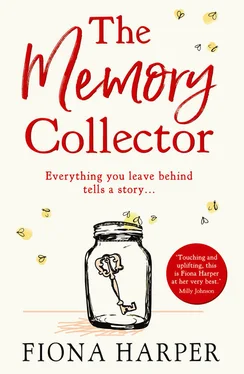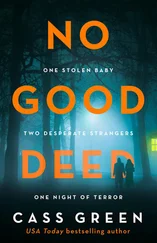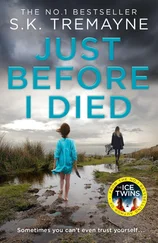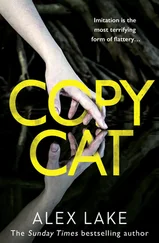1 ...7 8 9 11 12 13 ...17 When that is done, she fetches the album and sits down on one end of her sofa. As Heather turns the first few pages, the sense of uncleanness at having been in the spare room fades. When she tries to think back to her childhood, which isn’t often, most of it is just a big white fog, yet here it is – all the things she can’t remember – in colour prints, yellowing a little with age. They come rushing up off the page to meet her.
There’s her mum and dad together, actually looking happy. She’d seen her dad smile like that when he’d met Shirley, but she’d forgotten he must have looked at her mother that way too once upon a time.
How odd. The only thing that drifts through the fog when she dares to look into it are raised voices and soft male sobbing. He left when she was still in primary school, and he had just got to a place where he couldn’t take it any more. She doesn’t blame him for leaving. Who in their right mind would have wanted to stay?
She looks at the photos on the opposite page. One draws her curiosity enough for her to peel back the protective layer and prise it from the gluey lines holding it down. On the back, hastily scrawled in biro, it says ‘Kathy and Heather, Eastbourne (1994)’. Heather places it back down and smooths the cellophane over the top. They’re standing against some metal railings at the seafront. It’s sunny, but obviously windy. Aunt Kathy is smiling brightly at the person behind the lens, and so is the little girl next to her, but her hair is being blown forwards over her face so Heather can’t even see her own features. She’s holding a mint-choc-chip ice cream, though, so she doesn’t seem to care about the wind.
Mint choc chip. I used to love that, she thinks. How did I forget?
That holiday with her aunt is the one bright oasis in the pearly fog of her childhood, the one thing that stands out, bold and colourful. She remembers those two weeks as if they were yesterday – except she doesn’t remember this photo being taken. Never mind. The rest is still clear: building sandcastles with complex moats on the beach, fish and chips under one of the shelters on the pier after a sudden cloudburst, crazy golf… Oh, how she’d loved the crazy golf, even if it took fifteen attempts to get each ball in the hole. But Aunty Kathy hadn’t minded, she’d been patient and encouraging and had never once hurried her along.
The little girl in the photo looks happy. Heather knows it must be her, but she doesn’t recognize herself. This girl looks as if she might grow up to be someone nice, someone with a good job and maybe a decent man to love. Not a freak who can’t even go into her spare bedroom without having an epic meltdown.
Heather’s eyes go dull and she stops smiling. Aunty Kathy. She hasn’t seen her favourite aunt since her childhood. Yet another casualty of her mother’s addiction. Heather closes her eyes. Her mother had been selfish, so selfish. Driving everyone who loved her away. Sometimes it had seemed as if she was on a mission to make everyone hate her.
Heather shakes her head and opens her eyes again. She’s not going to think about that now, because far from recoiling from the other memories leaping up at her from the pages, she’s actually enjoying this. She doesn’t remember seeing any of these photos before. Probably because this album had been buried under two tons of crap in her mother’s house for most of her formative years, and since Heather had taken custody of the belongings… Well, let’s just say she hadn’t wanted to go there.
But these photos are safe. They’re two-dimensional, stored behind cellophane so they’ve stayed clean and nice. Not like the rest of her mother’s stuff, which is too rich with memories, too immediate. Her mother always said she had to keep most of her stuff because the objects were her memory keepers. She’d pick up something – an ornament or a book, even a piece of Tupperware for the kitchen – and she’d be able to reel off all sorts of details about the item: when she’d bought it or who had given it to her, along with a story. There were always stories.
But Heather doesn’t want those memories; she doesn’t want that talent. On some level, she misses her mother, grieves for her, but that is obscured by the overriding sense of fury that engulfs her every time she thinks about her. So selfish. And then to leave things so Heather had to inherit what was left of her crap, had to take responsibility for it. She never asked for that burden and she doesn’t want it, and she can’t even go and shout at her mother for her final self-absorbed act, for once more protecting her stuff more than caring about what was good for her own flesh and blood.
Heather takes a deep breath and refocuses on the photograph album. Not thinking about that, remember? It only ever makes her miserable, and it’s a wonderful revelation that there were some happy things that happened in her childhood, evidenced in the smiles and laughter caught on these pages.
There’s a snap of a few older people at what looks like a birthday party. She thinks two of them might be her grandparents – her father’s parents – but she’s not sure. They both died when she was very little. And thinking of little… the next page reveals a picture of her and Faith taken at Christmas. They’re wearing matching woollen jumpers in a horrible shade of orange, but they are hugging onto each other and doing their cheesiest grins for the camera so their faces are all teeth and hardly any eyes. It makes her smile.
But then she notices something, and the joy slides from her face.
The room behind them… It’s empty.
Well, not actually empty, but… normal. She can see a wall painted in magnolia. An actual wall. Heather’s not even sure she knew what colour the walls were in some parts of her family home because, as far as she could remember, they’d always had things stacked against them.
Heather stares at the picture, unable to tear her eyes away. It’s a shock to realize her mother’s house hadn’t always been that way, although, if Heather didn’t studiously avoid thinking about her mother in every waking moment, maybe she’d have worked this out by now. After all, she can’t have been a hoarder from birth. It had to have started somewhere. For the first time, Heather asks herself when.
The problem is that she hadn’t been able to talk to her mother about her hoarding. Even as an adult, if she’d tried to raise the subject, her mother would get defensive and cross. ‘There’s nothing wrong with a bit of clutter,’ she used to say. ‘I’m a collector, that’s all.’ And Christine Lucas had been right about that. She’d collected everything as far as Heather could remember: newspapers, old plastic pots, clothes – lots and lots of clothes – every toy Heather and Faith had ever owned, even though many were broken and unwanted by their owners.
There had been the china ornaments, cutesy little things – unicorns and fairies, covered in glitter – that had made Heather want to gag. Worst of all were the dolls. Even now, when Heather thinks of the frilly dresses, the porcelain faces with staring blue eyes, it makes her shiver.
But there seems to be none of that in this photo. From the outside, and at a distance of more than twenty years, these two girls look as if they come from a normal, happy family.
She can’t resist pulling the cellophane back, even though it tears a little in the corner, to check if there’s writing on the back of the print. There is: ‘Faith and Heather, Christmas 1991.’ Heather does the maths: Faith would have been eight, just about to turn nine, and she would have been five.
She turns the page. This one is close enough to the back of the album that the spine creaks and shifts, pulling the pages behind it open, and some things fall out the back of the book: more photographs and a couple of hand-drawn birthday cards from her and Faith to their mum. This makes an odd warm feeling flare in Heather’s chest. Normally, she hates the idea of her mother keeping anything, especially if it had sentimental value – because everything she owned had sentimental value, even the bags of rubbish that had filled the kitchen so they could no longer cook in it, let alone eat at the table – but this is something she can understand. Somehow, it helps her breathe out.
Читать дальше












